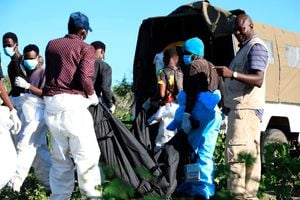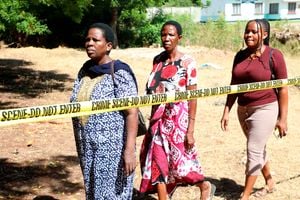
At least 390 bodies exhumed from Shakahola remain unclaimed at the Malindi mortuary.
Phase Five of the exhumation of bodies at Shakahola forest in Kilifi County began this week but the exercise continues to paint a sad picture of what happened in the forest as more bodies are discovered that could add to the hundreds of bodies lying in the mogue that nobody is willing to claim.
This week, 17 bodies were exhumed, bringing the total to 446 since the exercise began after the discovery of an alleged cult linked to Pastor Paul Nthenge Mackenzie.
As more bodies are discovered, the government faces the challenge of exhuming at least 390 bodies lying at the Malindi sub-county hospital mortuary.
Also Read: Inside Shakahola’s holy betrayal
The government's chief pathologist, Johansen Odour, confirmed the challenge the government faces in disposing of the bodies as the morgue continues to fill up at a rapid rate.
Dr Odour said the failure of families to come out to assist in the identification of the bodies remains a major challenge, "that is why we are calling on Kenyans to cooperate at this stage to complete the identification of the bodies.
"Out of the 429 bodies exhumed in the previous four phases, 32 bodies of those exhumed have been released to their relatives for burial while others are yet to be claimed. We are appealing to more people who suspect that their relatives may have disappeared from Shakahola to come out for DNA matching as the government has acquired adequate reagents to speed up the identification process," the chief pathologist said.
Dr Odour continues to urge those who have lost loved ones to come out and collect the remains of their loved ones to make room for more bodies.
The unclaimed bodies continue to be a burden not only on the national government, but also on the Kilifi County government, which is struggling to pay for and maintain the bodies.
Last month, Kilifi Governor Gideon Mung'aro said the preservation of the bodies was a burden on the county and an inconvenience to those visiting the hospital.
According to the governor, the county has been paying Sh36 million in electricity bills to preserve the bodies, which amounts to about Sh2.9 million every month, and called on the national government to intervene.
"I have been paying electricity bills with money meant for the people of Kilifi. I have paid money to support activities in Shakahola. That is a national government function. I have no budget for that. How do I account for such money when the Auditor General questions the expenditure," he said.
But the burden is not only on the preservation and storage of the bodies, the government continues to invest and mobilise more resources to carry out the exhumation to international standards.
Dr Odour said the identification and collection of evidence during the exhumation of the bodies in the Shakahola forest was a lengthy, complex and resource-intensive exercise, involving expertise from various sections of the Directorate of Criminal Investigations.
He said the multi-agency team had to be deployed to build a watertight case against the suspects involved in the Shakahola mass murder.
"The government is determined to bring those responsible for the atrocities to justice. That is why it is putting a lot of resources into this exercise. We have officers from the Directorate of Criminal Investigations, including those from Forensics and Crime Scene Investigation, Homicide, morticians and pathologists on the ground who are responsible for exhuming the bodies," said Dr Odour.
He added: "This is being done in accordance with international standards, as the evidence will be used in court to prosecute the suspects behind the cult".
As more bodies are exhumed and evidence is gathered, detectives say there is also the possibility of more charges being brought against preacher Mackenzie and his other accomplices, who already face other charges including murder, manslaughter, radicalisation and child torture.
The 4,000-acre forest remains abandoned and under heavy security as it is still a crime scene and a disturbed area, as gazetted by the government. GSU officers have set up camps and regular patrols are carried out to prevent anyone from entering the forest, which sits on the vast Chakama ranch.












